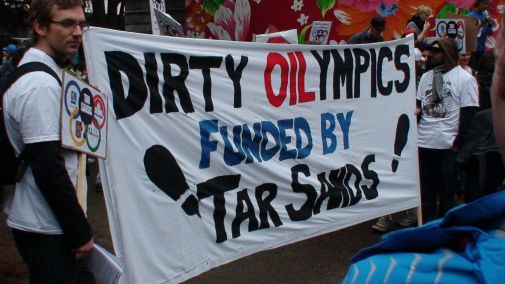London UK Tar Sands Oilympics Protest
London, UK, Tar Sands Oilympics
On Feb. 21, 2010, the London Tar Sands Network and London Rising Tide hold the inaugural Tar Sands Oilympics in Trafalgar Square, London.
Corporate contenders RBS, Shell and newcomer BP compete for the chance to wreak environmental havoc in their scramble for Canada's tar sands.
In the process they will lay waste to vast areas of boreal forest, poison First Nations communities and push the planet towards catastrophic climate change.
The race for the most polluting fossil fuel resource on the planet is on. Forget the Winter Olympics in Canada, the real competition for the future of the planet is here.
For more info:
http://tarsandsinfocus.wordpress.com
YouTube Video of Protest:
http://www.youtube.com/watch?v=mxWxKNFErB0
Campaign on tar sands extraction targets oil investors
BBC News, Feb. 22, 2010
http://news.bbc.co.uk/2/hi/business/8527853.stm
Protest against tar sands industry outside Canadian Embassy in London
Campaigners against the extraction of oil from tar sands are encouraging people to lobby their pension schemes if they hold shares in Shell or BP.
Both firms face resolutions at their shareholder AGMs, questioning their involvement in the business.
The website of Fairpensions lets people send an e-mail direct to their pension fund or ISA provider.
The initiative is being supported by a coalition of trade unions and environmental campaigners.
Catherine Howarth, chief executive of Fairpensions, said the e-mail campaign was an attempt to improve the accountability of both companies and their major investors.
"People do not always realise that their pension provider holds shares in major companies on their behalf," she said.
"Anyone with pension savings has a right to lobby their fund manager on how to vote on these vitally important resolutions," she added.
Problems
The extraction of oil from the world's huge fields of tar sands, in countries such as Canada, is controversial.
It leaves a much smaller footprint in the surface
BP spokesman
The oil is naturally present as a particularly sticky form of bitumen, typically mixed with sand.
Campaigners say the most common extraction process, akin to open-cast mining, produces far more greenhouse gases than normal oil extraction, leaves large amounts of toxic waste and causes widespread damage to the environment.
The resolutions that some shareholders have submitted to the annual general meetings - BP's in April and Shell's in May - call on the companies to justify their investment in the business and explain what they are doing to counteract the problems associated with it.
"One thing the resolution calls for happens already," said a BP spokesman.
"It calls for senior BP management to engage with the investment community, and we do that anyway."
Underground
BP explained that so far, it had not produced a drop of oil from its tar sands project in Alberta in Canada.
It hopes to give the final go-ahead for the plan, known as project Sunrise, later this year.
The spokesman explained that the tar sands field it was interested in was underground, not on the surface.
The oil will be extracted via wells and underground pipes, in a process developed over the past decade called steam-assisted gravity drainage.
"It leaves a much smaller footprint in the surface," he said.
Email campaign
Fairpensions' web-tool lets individuals type in the name of their pension scheme or ISA provider.
This generates an e-mail that can be sent to the relevant pension fund or investment manager, calling on them to support the AGM resolutions.
The plan is supported by groups such as Greenpeace, WWF, the Co-op and several trade unions.
Dave Prentis, general secretary of the large public sector union Unison, said: "We're getting the word out to our 1.3 million members in Britain's public services, encouraging them to express support to their pension funds and savings institutions."
"Our members' pension funds have an estimated investment value of £250bn, so at Unison, we understand the need for a low-carbon economy.
"These resolutions demand the clear answers from oil companies which our members need and deserve," he added.
